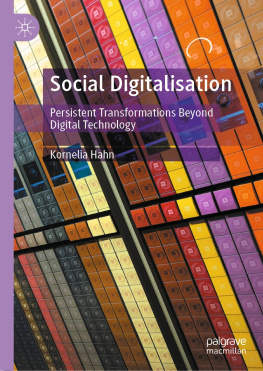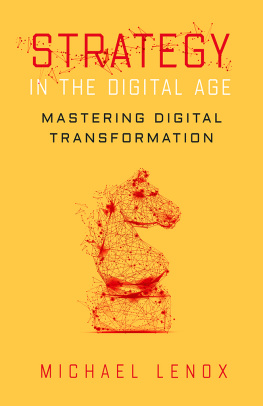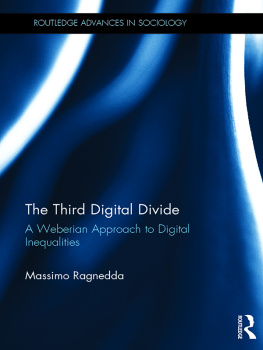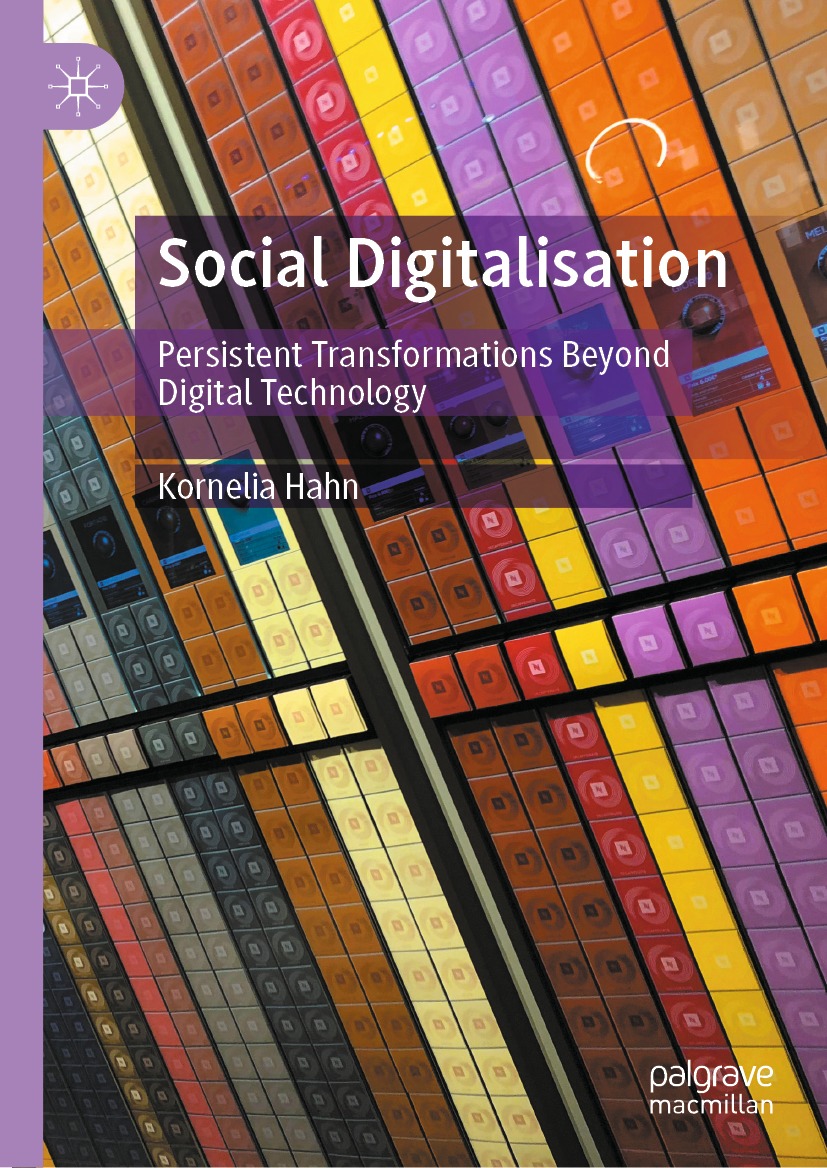Kornelia Hahn
Social Digitalisation
Persistent Transformations Beyond Digital Technology
1st ed. 2021

Logo of the publisher
Kornelia Hahn
Politikwissenschaft, Universitt Salzburg, Salzburg, Austria
ISBN 978-3-030-79866-6 e-ISBN 978-3-030-79867-3
https://doi.org/10.1007/978-3-030-79867-3
The Editor(s) (if applicable) and The Author(s), under exclusive license to Springer Nature Switzerland AG 2021
This work is subject to copyright. All rights are solely and exclusively licensed by the Publisher, whether the whole or part of the material is concerned, specifically the rights of translation, reprinting, reuse of illustrations, recitation, broadcasting, reproduction on microfilms or in any other physical way, and transmission or information storage and retrieval, electronic adaptation, computer software, or by similar or dissimilar methodology now known or hereafter developed.
The use of general descriptive names, registered names, trademarks, service marks, etc. in this publication does not imply, even in the absence of a specific statement, that such names are exempt from the relevant protective laws and regulations and therefore free for general use.
The publisher, the authors and the editors are safe to assume that the advice and information in this book are believed to be true and accurate at the date of publication. Neither the publisher nor the authors or the editors give a warranty, expressed or implied, with respect to the material contained herein or for any errors or omissions that may have been made. The publisher remains neutral with regard to jurisdictional claims in published maps and institutional affiliations.
Cover illustration: Hugh Williamson/Alamy Stock Photo
This Palgrave Macmillan imprint is published by the registered company Springer Nature Switzerland AG
The registered company address is: Gewerbestrasse 11, 6330 Cham, Switzerland
The focus on social digitalisation theory offers an original contribution to the field. I particularly liked the breadth and depth of historical examples that the book presents in an engaging and compelling demonstration of the social and historical processes underpinning transformation.
Kate Orton-Johnson, Senior Lecturer in Sociology, University of Edinburgh, UK
To my son Tyrique
Preface
Writing this book in the year when COVID-19 first swept the globe has inevitably come with unforeseen effects, including on my own stance towards the phenomena explored in these pages. Like many academic instructors and authors, I had longed to have more time to work at home before the lockdown ruled out any other option. In spite of the privilege of being able to continue to work in these circumstances, it seemed at first that writing a book in the midst of a global cataclysm might be something of a sideshow.
However, the pandemic has also compelled me to speculate, like many others, not only on the scale and depth of changes likely to be accelerated and generated by this pandemic but also on the role that might be played in these changes by the very subject of this book, i.e. by transformative processes of social digitalisation.
Back in the classroom in March 2020, just as I was announcing the teaching schedule for the coming week, it was through my students connections to the outside world via their digital devices that I first learnt there would be no more face-to-face classes for the foreseeable future. The university had just ordered an immediate lockdowna state whose significance most of us were still only beginning to grasp. Worldwide, across every sector of society and the economy, rapidly adjusting to this state has entailed harnessing the resources of material digital technologies on an unprecedented scale. Such technology has proved pivotal both in tackling the direct health impacts of the pandemic and in enabling many people to continue performing much the same work they were doing prior to the lockdown. In my own case, for example, the transition to teaching online proceeded quite smoothly over a matter of weeksso smoothly, in fact, that it is hard to imagine there will ever be a complete return to pre-pandemic routines.
While the application of digital technology in relation to the pandemic raises many questions, and while we have witnessed many tragic failures to mitigate the virus, such technology has undeniably proved immensely helpful and even essential for people coping with lockdown conditions and other impacts of the pandemic. For better or worse, the outcome is that more and more areas and activities have swiftly become connected with and/or organised by digital processing.
With digital technology set to become ever more ubiquitous over the coming years, the hope that has helped drive me in writing this book is that our globally shared experiences of the pandemic will lead to more profound assessments of further digital transformation, including assessments from the perspective of social theory as set out in this book.
The social theory approach proposed and elucidated here is primarily concerned with long-term developments in digital processing, including those set in motion long before the advent of material digital technologiesin some cases prior to the so-called Age of Steam. From this perspective, the Digital Transformation is thus understood as a trajectory rather than a sudden disruptive change. This approach is above all focused on the re-organisation through digital processing of social activities that were previously more or less contingent. Such re-organisation involves simultaneous and intertwined processes both of discontinuance through the digitisation of discrete units and of continuance through the application of streamlined programming, necessarily complemented by what I term co-programming on the part of ourselves as interpreters.
What should be noted here already is that these intertwined processes can only be set in motion by strategic actions and deliberate decisions, with such actions and decisions often taken in a highly non-transparent way. Once processes have been made digital, moreover, the dynamics of this transformation generally do not encourage or support any further assessment of its trajectory. Public and scholarly discourse about digital transformation has thus far mostly limited itself to a consideration of policies without shedding much light on the political decisions that have led to the implementation of overall digital processing. In this book, by contrast, I call for a critical analysis of the impacts of social digitalisation that goes beyond an assessment of implemented material digital technologies and the policies related to their use. Failing to undertake such an assessment of social digitalisation on the run would itself constitute a political decision. An important aim of the approach I propose here, therefore, is to contribute to assessments of ongoing and future digital transformation and thus to facilitate more informed decisions and policies better designed to address the consequences of such re-organisations of social activities.
If this book has a message, then, it is a call for all of us to think about digital transformation as a form of social processing beyond technology. The intention here is not to set out a case against the implementation of digital technology per se but rather to emphasise the importance of understanding the social conditions in which digital technology is implemented and how its implementation is likely to change the trajectory of social processes. A key element of this approach is thus the need to consider the consequences of digitalisation from a










